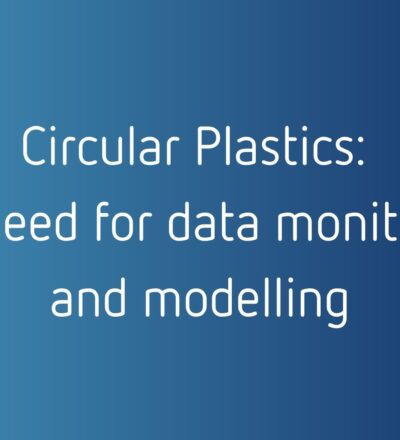To make the plastics industry more sustainable faster, we need data. Data on the quantity, quality and exact location in the value chain of plastics available for recycling. During the Circular Plastics Conference 2022, we will pay extensive attention to the challenges that affect the entire chain, such as the need for data. If we want a circular society, we must address these challenges together.
There are at least 250 types of plastic on the market, the vast majority of which are not recycled. Roughly one third of post-consumer waste plastics within the European Union are currently being recycled, but the remaining is either being incinerated for energy recovery or still disposed of in landfills.
Steering towards a circular economy for plastics
Policymakers in the European Union are steering towards a circular economy for plastics. They are directing the responsibility towards manufacturers of (consumer) goods. So for them, it is necessary to have insight into how circular their plastics are. Data for this is required to measure circularity within the value chain.
Two challenges
Two challenges stand in the way of integrating data monitoring and modelling within the value chain:
- The lack of broad and intense collaboration that gathers all of the critical players of a value chain
- Manufacturers throughout the plastics value chain are reluctant to share insight into the quantity of what they manufacture. Using digital tools, this data can be shared privately without publishing its origin. Using these methods is necessary to onboard manufacturers of goods and policy enforcers.
Through transparency into the chain and monitoring, it is possible to devise smarter solutions for recycling and to devise scenarios with which we can increase this even further.
This article is part of a series of 3
- Circular Plastics: how to make it feasible and affordable?
- The need for data monitoring and modelling through mass balance analysis and circularity evaluation
- The need for knowledge-based design of plastic products
Join our plastics-LinkedIn and stay up-to-date.
Collaboration: how data can help
Within the EU, mandatory monitoring of all CO2 cycles will become mandatory by 2028, with the goal of being able to assess circularity of those cycles. To make plastics circular, we need to know which types of plastic are in the value chain, their quantity and quality. Without this information, producers of plastic goods cannot possibly assess the circularity of their products.
If they are be able to better estimate which types of plastics will become available for recycling, they also have a better idea of the various options, and the data will provide a new understanding in terms of sorting, collection logistics and improvements in sorting and recycling technologies.
In short, only through data we assess whether the new processes that are being developed improve recycling, which is important to all parties active in the value chain.
New project: how to safeguard privacy of chain partners?
A major reason why people are reluctant to share data is its competitive sensitivity. No company wants to provide too much insight into their core business. Understandable, but unfortunately it counteracts chain collaboration.
The Circular Plastics Initiative (CPI) wants a system where data is sufficiently accessible to other parties in the value chain, but where the privacy of chain partners is safeguarded. To achieve this, an investigation is required. This investigation is part of a project that we are currently launching with the help of the MOOI scheme (subsidy scheme for Mission-oriented Research, Development and Innovation).
The main goal of that project is to enable partners in plastic value chain(s), based on facts and model data, to optimise their process and material use in such a way that this will deliver the best possible quality of recycled material, now and in the future. This generates the best possible business cases and road to success. The second goal is creating an integral view of the plastic value chain(s) with respect to mass flow and relevant quality parameters.
Let’s tackle these challenges together and join our Circular Plastics Initiative (CPI)
